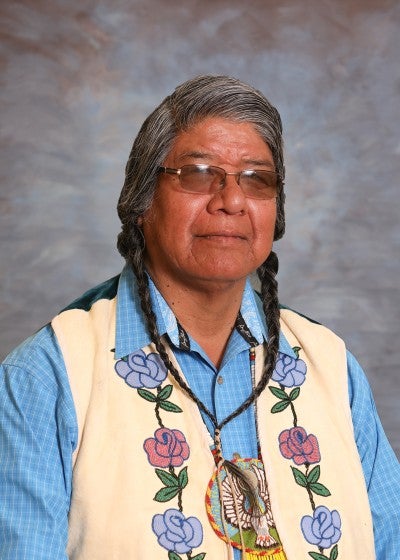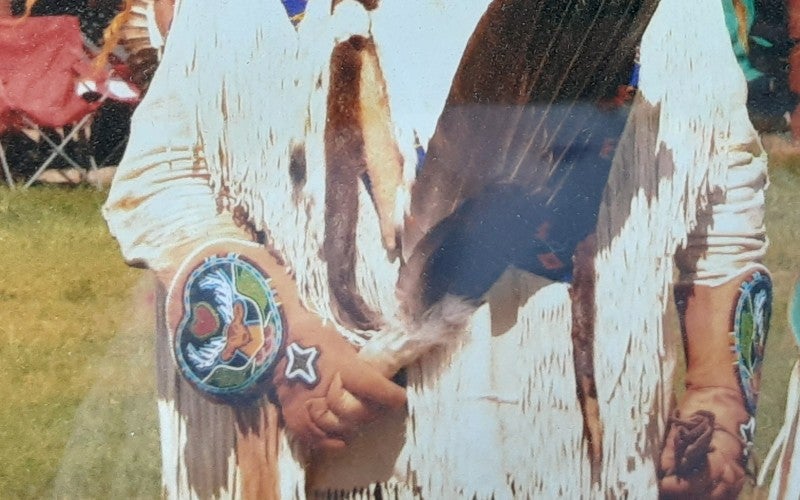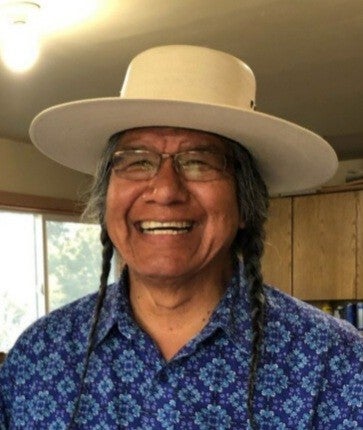Wilson Wewa (Warm Springs) is a storyteller, spiritual leader, and the Warm Spring’s Paiute Tribe’s oral historian. A descendant of Paiute Chief Paulina and Chief Weahwewa, he learned most of the stories and legends he tells from his grandmother and tribal elders in Oregon, Washington, Nevada, and California. Wewa is the author of Legends of the Northern Paiute (2017, OSU Press).
Bio
Wilson Wewa (Warm Springs) is a storyteller and the Warm Spring’s Paiute Tribe’s oral historian. He is the descendant of Paiute Chief Paulina and Chief Weahwewa (the name Wewa is a shortening of the original family name). Wilson Wewa, who grew up on the Confederated Tribes of Warm Springs reservation, spent considerable time at his grandparents’ ranch at the south end of the reservation; there, he learned to ride, care for horses, and more. His grandfather, Sam Wewa, taught him the names for local trees, animals, and plants as well as traditional remedies for illnesses. He also taught his grandson the names for stars and constellations; by following their movement through the seasons, his grandfather and father, Wilson Wewa, Sr., knew when it was time to hunt. Wewa learned most of the stories and legends he tells from his grandmother, Maggie Wewa, and Paiute and Shoshone elders, aunties, and uncles of the Confederated Tribes of Warm Springs, Duck Valley, Fort McDermitt, Pyramid Lake, Burns Paiute, and Walker River reservations as well as those in the community at Fort Bidwell, CA. Wewa remembers first hearing Northern Paiute stories when he journeyed with Maggie Wewa to dig roots in the springtime near Burns, Oregon. Elders would tell stories in the evenings or just in passing as they explained Paiute names for animals or plants. As a child, he also accompanied his grandmother as she traveled to Paiute stick game tournaments, rodeos, powwows, and funerals around the Northern Great Basin. When he was older, he drove his grandmother to visit relatives in the region; on those trips, she would reminisce about the people and places she knew. In his book and for his public presentations, Wewa shares accounts of those travels as well as the traditional Paiute stories his grandmother and other elders exchanged at their tables, in their cars, or under trees. Wewa's oral histories and stories are deeply rooted in the rugged, high desert environment of the region, where Paiute bands lived and work together to hunt, fish, gather roots and berries. Not surprisingly, settlements clustered around the region’s rivers--the Deschutes, John Day, Powder, Burnt, Malheur, and Owyhee. Paiute legends, which are often humorous, reflect this environment and serve to educate, entertain, and reinforce Paiute values and norms as well as lessons from the past. Only small numbers of Paiute survived the US government’s land-grabbing, armed attacks, and forced removal of tens of thousands from their homeland to reservations that reached from what is now northern Nevada, through eastern Oregon, to southern Washington state and western Idaho. Decades of trauma from the boarding school era resulted in loss of cultural traditions, from food procurement and preparation to language itself. Wilson Wewa’s efforts to preserve, record, and pass on Paiute history, legends, and stories of everyday life are critical to his people’s cultural continuity and survival. Wewa is well known throughout the northwest plateau and the Great Basin as a keeper of traditional culture. He recounts traditional stories and passes on his Tribe’s histories at the Confederated Tribes of Warm Springs, where he and his family live. He also shares those stories for Paiute ceremonies and burials and, on occasion, at academic seminars and classes.




